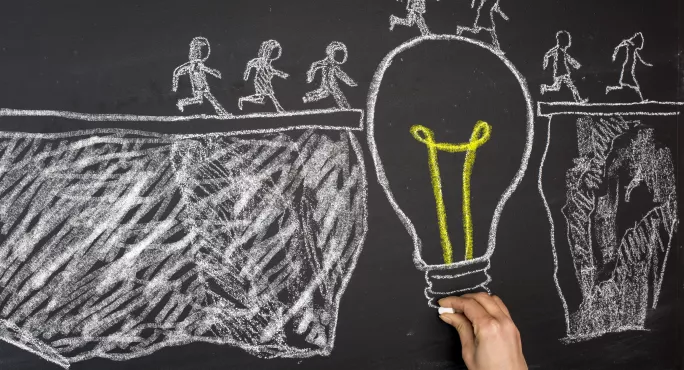- Home
- Our students can’t wait 500 years for fairness
Our students can’t wait 500 years for fairness

Each year, the Education Policy Institute reports on the gaps between disadvantaged pupils and their peers. This has become our annual picture of how fair our education system is and how well we are doing at ensuring that it enables every child to succeed, no matter their background.
For several years, the report has found that progress is being made and the gaps have been closing, albeit slowly. (Worryingly, however, this has not been true for the most persistently disadvantaged pupils.)
Social mobility: Gap between rich and poor pupils ‘stagnating’
Inequality: Revealed: The attainment gap for looked-after children
News: ‘Wake-up call’ for Boris Johnson on GCSE inequality
This has been somewhat reassuring news for those of us, inside and outside education, working hard every day to support pupils from disadvantaged backgrounds and do our bit to secure a fairer education system for all. Indeed, there are thousands of committed individuals and hundreds of organisations whose intention is “closing the gap”. The Fair Education Alliance is made up of exactly these - education establishments, unions, policy bodies, charities, social enterprises and businesses, all of which are working to change the life chances of pupils from disadvantaged backgrounds. Successive governments and education ministers have also made this a central priority in education policy. So we would certainly hope to see inequalities being addressed.
However, in this year’s report, the picture is alarming.
The report makes a projection of when the GCSE disadvantage gap would be closed, given the latest five-year trends. In the past few years, projections suggested that the gap would be closed in this century, but last year, this projection slipped into the next century. Notably, this year’s figures suggest it will take 500 years for the gap to close.
Projection of when the GCSE disadvantage gap in English and Maths will close
Source: Education in England: Annual Report 2019 (EPI and FEA Joint Report)
Although progress continued at primary level, the gap in early years has stagnated and the gap in secondary is widening. Moreover, overall figures mask huge regional variations and disadvantage gaps are larger and growing in parts of the North of the country.
For several decades, figures and groups from across the sector have been making efforts to improve education for the most disadvantaged, but we can no longer ignore that the sum-total of these efforts is resulting in only marginal progress in closing the gaps at the systemic level. Work to tackle inequalities is fragmented and often done in silos. There are many actors who all have the same vision, but all have their own views on how to approach it, resulting in competing voices rather than a joined-up approach. Those closest to the issues who might also have solutions - communities, young people, teachers and school leaders - often lack the platform to influence change. Impactful work is changing the lives of some young people, but it is a lottery: some young people, in some areas, are getting the support they need but there is not a consistent and holistic approach. Change must be felt across the country and be realised for every young person.
The FEA comprises 150 organisations from across society - education, business and the third sector. These organisations believe that changing this picture is not for the education sector to solve alone; this is an issue that affects everyone and we all have a stake and a role in addressing it. In joining the alliance, they have committed to a new approach: to work together and to pool our collective evidence, expertise and efforts to enable the system transformation that is urgently required.
By first facilitating dialogue across the Alliance, we build consensus on what needs to change. From this, organisations can then take collective action and a joined-up approach to change - achieving results beyond organisational interests. We influence policy and practice, building momentum for system-wide change for the benefit of disadvantaged children. From 2019, we will be providing active backing of grassroots action, finding and nurturing new social innovations and helping to scale up existing successful practice.
The three key system changes the Alliance has collectively decided to focus on are as follows:
-
Creating an education system that develops the whole child; developing skills and social and emotional competencies, alongside academic attainment
-
Ensuring that we are supporting great teachers and leaders to work and thrive in schools serving disadvantaged communities
-
Providing better support for all post-16 destinations so that young people have the knowledge, skills and awareness of options to make the right choice for them.
At such a moment of great change in this country, we are also at a point of opportunity. What the future holds is in our hands. The ongoing inequalities exposed in this report are not something we can or will tolerate for 500 years. We must come together across sectors, across societal divisions and across our country’s regions to continue our work with renewed force in building an education system that will serve all young people - whatever their background. The stakes for our children and young people and their future are high. They deserve no less than that we all give them our best.
Sam Butters is CEO of the Fair Education Alliance (FEA). If you want to find out more about the FEA and how to get involved, please contact info@faireducation.org.uk
Keep reading for just £1 per month
You've reached your limit of free articles this month. Subscribe for £1 per month for three months and get:
- Unlimited access to all Tes magazine content
- Exclusive subscriber-only stories
- Award-winning email newsletters